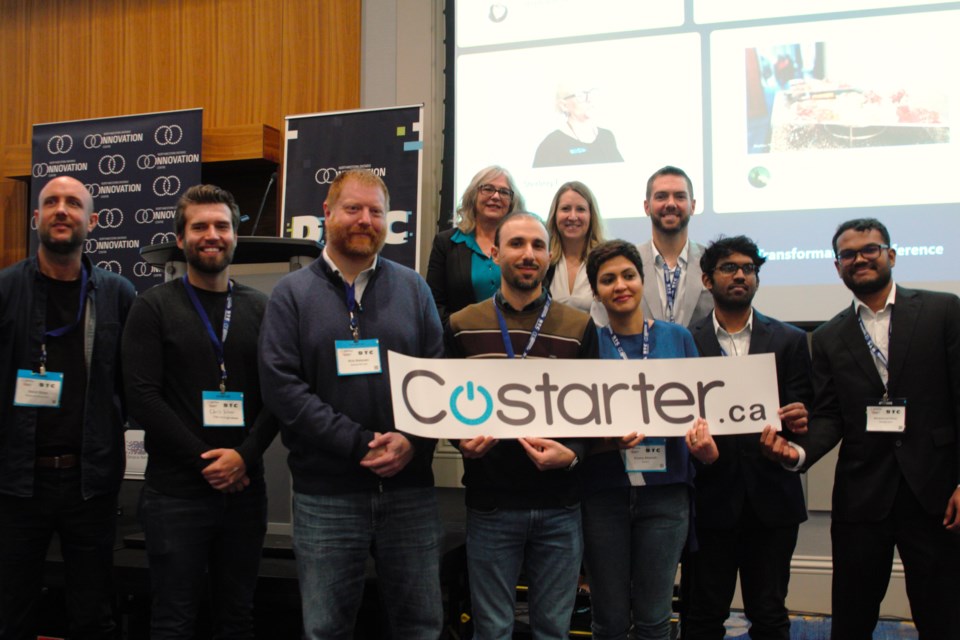THUNDER BAY — Five northwestern Ontario entrepreneurs are getting a major boost from an intensive business accelerator program supported by regional economic development organizations, with two eligible for investments of up to $250,000.
The Northwestern Ontario Innovation Centre announced the five finalists in its 12-week Costarter program, winnowed from over 40 applicants, on Sept. 28 at the second annual Digital Transformation Conference put on by the innovation centre.
The three-day Digital Transformation Conference, which wraps up at the waterfront Delta Hotel on Friday, featured dozens of speakers and lured hundreds of attendees.
This year’s conference focused on artificial intelligence and extended reality, with exhibitors showing off technology like StarLink, used to connect some remote communities with internet access, and augmented reality fire training.
“We’re trying to open people’s eyes as to what solutions are there today and how they can leverage them, for sure, but [also] what they need to be preparing for in the future,” said Jeff Coull, executive director of the innovation centre.
The Costarter finalists include Silver Vantage Software, focused on developing a thermal fall detection system for seniors; Work4U, an app intended to connect skilled workers like plumbers with residents needing small jobs done; Katchya Pet Toys, designing durable, safe, and unique toys for dogs and cats; Waves and Frequencies, a hi-fi venture looking to make superior audio an integral part of everyday spaces; and Skillsun, a platform for job-seekers offering AI-powered job applications and career guidance.
Four companies are based in Thunder Bay, while Work4U is looking to launch in Kenora.
The innovation centre rebranded the accelerator program Costarter 2.0, recognizing an infusion of funding Coull hopes will help two of the businesses scale up in a big way.
The five participants will spend the coming weeks embedded at innovation centre offices in Thunder Bay and Kenora, participating in workshops and working with industry mentors to advance their projects.
At the end of that period, one company in each community will be eligible for a $250,000 investment to scale their company. That larger funding is contingent on achieving certain requirements and deliverables.
That investment, offered for the first time this year, was made possible through contributions from Thunder Bay CEDC, Thunder Bay Ventures, Lake of the Woods Business Incentive Corporation, and the City of Kenora’s economic development and tourism department.
Even for entrepreneurs who don’t qualify for that windfall, the Costarter program can serve as a crucial launching pad, said Coull.
“In our previous Costarter programs, we’ve launched many successful companies just with $15,000 for the 12-week program, which we’ve been fortunate enough to increase to $18,000 this time,” he said.
He added the innovation centre will also seek angel investors and government support for those other companies.
“We’re really satisfied with the quality of candidates we have in the program this year, and honestly, when it comes to the $250,000 at the end, it’s going to be a struggle to determine who is the best fit for it,” he said.
Christopher Silver, CEO and founder of Silver Vantage Software, called support from Costarter program “invaluable.”
“Between the finances to help support it and the mentors and all the resources they provide, it’s everything I could have asked for and more already. It’s great.”
Silver, who has a bachelor’s degree in software engineering and is currently studying for his master's degree in electrical and computer engineering at Lakehead, said his venture to detect falls with thermal technology was inspired by both his studies and personal experience.
“My grandma had fallen in her long-term care home,” he said. “She’s okay, but we thought if we had our system in place, she could have gotten the help she needed a lot sooner. It was multiple hours on the ground before someone was able to come help her. That was kind of the whole inspiration.”
His company is using machine learning and thermal sensors or cameras mounted on ceilings or wall of a room to detect falls.
“It scans the whole environment, and if it detects there’s been a fall, it will alert a family member or a PSW so the elderly person can get the help they need as soon as possible,” he said.
One in three seniors fall every year, he said, and falls cost the health care system around $2 billion per year.
“It’s a big need both financially, but also for people trying to be safe and living everyday life. The system is hoping to really help people who don’t have visitors all the time.”
Eventually, he hopes the technology can also help predict falls before they happen by monitoring mobility scores, and tracking other health metrics like social and sleeping scores.He’s currently looking for participants to sign up for fall detection trials, doing safe falls onto mats. More information is available at the company’s website.
Mohamed Inam Rishan, marketing strategist for the company behind the Work4U app aiming to launch in Kenora, also called Costarter transformational.
“I think giving us startup [funding] and helping with mentors, assisting us on how we can hit milestones… will help us very drastically,” he said.
The app is intended to benefit both skilled workers and those needing a job done.
“It’s an app to hope local plumbers, carpenters, and electricians find small jobs,” he said. “Let’s say, for example, at home there’s an electrical problem, you take a photo of it and put it on the app, and then any worker around the area can respond to your inquiry.”
They plan to verify certifications like red seals for some workers like electricians, but the app will also be open to those with non-certified skills like gardening.
To follow the progress of the Costarter program, Coull suggested subscribing to the innovation centre’s newsletter or following its blog.
— TBnewswatch




